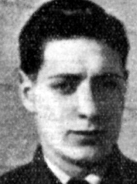 The son of Nathan, Ralph Moster was born on 29th August 1924 in Hamilton, Ontario. He completed his high school studies in Vancouver, British Columbia.
The son of Nathan, Ralph Moster was born on 29th August 1924 in Hamilton, Ontario. He completed his high school studies in Vancouver, British Columbia.
During World War ll he served in the Royal Canadian Air Force, gaining much flying experience. When the Arab armies invaded Israel, he felt the need to play his part in the war in Israel.
He arrived in the spring of 1948 and joined the Palmach Yifatch Brigade’s armored group. When he saw how little equipment there was, he took it upon himself to repair a 50-caliber Browning machine gun acquired from a downed enemy aircraft, mounted it on his armored vehicle and used it in battle. While his unit mounted an attack on Malkiya from the rear, in error they attached themselves onto a group of enemy armored vehicles. They took out three armored vehicles and scored hits on a truck carrying arms, taking it over as booty for their own use.
Ready to return to their base, they isolated a convoy of enemy vehicles. Ralph’s machine gun failed to operate. He jumped from his vehicle and fired his Sten gun at a run into the enemy area.
On the formation of the Israel Air Force, he transferred and joined it, excelling as a pilot. Under his command the Negev Squadron carried out 35 operational flights in one night. He organized nocturnal bombing missions and by day flew to Tel Aviv to plan operations.
The Negev Squadron bombed Gaza, Faluja and El-Arish, and in three days its light aircraft dropped four tons of bombs on enemy concentrations. Later, Ralph excelled in operations as commander of one of the larger landing fields in Israel.
Spiritually, Ralph became deeply attached to Israel and expressed his desire to settle there. He loved the Negev, realizing and believing that it was one of the areas of Israel that would grow and flourish.
Letters to his parents expressed his confidence in victory. “The Arabs will not surrender, and because of that our fellows know clearly what they are fighting for.”
In October 1948 he had thoughts of paying a visit to his parents, but he cancelled this plan when he could not find a deputy. He decided to carry on his duties until the enemy was expelled from the Negev.
On December 7th, 1948, while being checked-out in a new seaplane on water take-offs and landings by instructor Oliver Holton, the plane was badly damaged on a landing when it hit the mirror-smooth surface of the Sea of Galilee. The plane sank in about 20 minutes, drowning the pilots and a passenger, Flight Engineer Alvin Levy.
Their bodies were only found much later, and Ralph was laid to rest at the Nachlat Yitzhak military cemetery on December 20th. He was posthumously promoted to Flight Commander on orders from the Chief of Staff.
Translated from the Yizkor Web site
Excerpt from a letter written by Eddy Kaplansky to Ralph Moster’s brother (date unknown):
I have contacted quite a number of Ralph’s former friends who too remember your brother in a very vivid manner. Ralph very much deserves to be remembered. He was a man with a great number of friends since he was always ready to lend a helping hand. He served as a soldier in the First Brigade of the Palmach at a time when there were not enough planes in the Air Force, and after that, as a pilot in the Negev Squadron, helping from the air those same friends with whom he had fought in the Malkiya battles near the Lebanese border.
This week I met another friend of mine, Eliezer Har-Tuv, who remembers Ralph landing with his plane on the road in order to pick up a soldier waiting for a lift. This happened a few hours after Beersheba was conquered by the Negev Brigade of the Palmach. I am not sure that this was legal according to Air Force regulations, but it surely shows Ralph’s great rejoicing in the liberation of Beersheba, after he himself had taken part with us in the fighting when the Negev was still under siege.

